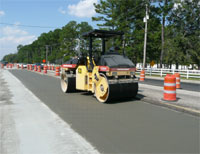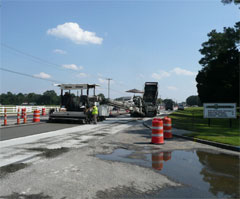The South Carolina Department of Transportation (SCDOT) recently witnessed the versatility of roller-compacted concrete (RCC) along US-78 near Charleston. To repair a heavily rutted five-lane section, the SCDOT decided to use a semi-rigid pavement system composed of two inches asphalt surface and 10 inches of RCC (utilized as a base) to repair the roadway and eliminate any future rutting.

Roller-compacted concrete is a stiff, zero slump concrete mixture that is mixed, placed and roller-compacted with the same commonly available equipment used for asphalt pavement construction. Roller-compacted concrete has generally been used in ports, logging yards, warehouse facilities, etc. where heavy static loads are present. Using RCC in a semi-rigid system is rarely used in the United States but the idea is gaining popularity as integrated pavement systems (a variety of cement-based products used in pavement applications. They are all similar, in that they all contain the three same basic components of portland cement, soils/aggregates, and water.) involving cement-based solutions are being recognized as cost effective alternatives to traditional paving techniques. Columbus, Ohio, for example regularly uses RCC in a semi-rigid system along local roads.
Banks Construction of North Charleston, South Carolina, was awarded the approximately one mile section of US78 and AG Peltz of Birmingham, Alabama, was chosen to construct the 30,000 square yards of RCC. Construction involved the milling of 12 inches of existing rutted asphalt, placement of 10 inches RCC and subsequent paving of the surface asphalt layer. All construction was under heavy traffic control along the four-lane section containing a center turn lane. With an (AADT) of more than 40,000 and 10 percent truck traffic, one lane was always open in both directions.

AG Peltz produced the RCC at an on-site pugmill adjacent to US-78. The aggregate used in theproduction of the RCC was a .75 inch minus SCDOT specification. Paving of the RCC proceeded when adequate milling had been performed. RCC was placed directly on the milled surface with an ABG-Titan high-density paver and final compaction was performed by the use of a vibratory tandem steel wheel roller. Joints were cut in the RCC at 20-foot intervals. The two inch asphalt surface was placed in as little as two days on the RCC.
The use of RCC provided a cost effective pavement for the repair of a severely distressed section of US-78 near Charleston. Along with the speed of construction and comparable cost to equivalent pavement structures, RCC will provide a long lasting foundation to a road plagued by an inadequate flexible pavement structure.
RCC Case Histories
Click here for more RCC case histories.